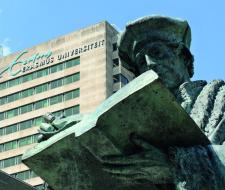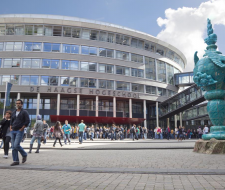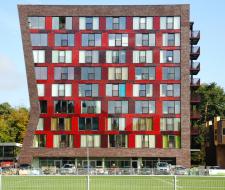Primary, secondary education in Netherlands for international students
-
 Accredited by Council of International Schools (CIS)
Accredited by Council of International Schools (CIS) NetherlandsEnschedeCurrently watching: 5from 15000.00 € / yearApply with documents
NetherlandsEnschedeCurrently watching: 5from 15000.00 € / yearApply with documents
-
 #15 in the Europe and #55 in the world
#15 in the Europe and #55 in the world NetherlandsAmsterdamCurrently watching: 7Apply with documents
NetherlandsAmsterdamCurrently watching: 7Apply with documents -
 INTERNSHIPS AT NIKE, GOOGLE AND MICROSOFT
INTERNSHIPS AT NIKE, GOOGLE AND MICROSOFT NetherlandsAmsterdamCurrently watching: 7Apply with documents
NetherlandsAmsterdamCurrently watching: 7Apply with documents -
 is in the Top 10 Countries to Study Abroad 2023
is in the Top 10 Countries to Study Abroad 2023 NetherlandsHagueCurrently watching: 6Apply with documents
NetherlandsHagueCurrently watching: 6Apply with documents -
 #4 in the Netherlands, #72 Worldwide
#4 in the Netherlands, #72 Worldwide NetherlandsRotterdamCurrently watching: 6Apply with documents
NetherlandsRotterdamCurrently watching: 6Apply with documents -
 Accredited by Council of International Schools (CIS)
Accredited by Council of International Schools (CIS) NetherlandsEnschedeCurrently watching: 5from 15000.00 € / yearApply with documents
NetherlandsEnschedeCurrently watching: 5from 15000.00 € / yearApply with documents -

 NetherlandsAmsterdamCurrently watching: 3Apply with documents
NetherlandsAmsterdamCurrently watching: 3Apply with documents -
 ranked 21st in the Netherlands
ranked 21st in the Netherlands NetherlandsHagueCurrently watching: 5Apply with documents
NetherlandsHagueCurrently watching: 5Apply with documents -
 Apply with documents
Apply with documents
Alternative destinations
Education information
Today, the Netherlands attract a wide range of foreign students from all over the world with high-quality educational services and interesting culture. Many international students choose studying in the Netherlands as it's a great opportunity to combine effective courses with exciting rest. SMAPSE offers TOP-5 prestigious primary and secondary schools where international students can get high-quality and balanced primary and secondary education.
Please, don't hesitate to contact SMAPSE experts as they are always ready to answer all your questions.
Secondary Schools in Netherlands for International Students
Overview of Secondary School Choices in Netherlands
In the Netherlands, students transition to secondary school around the ages of 12-13, and at this early stage, they begin to consider their future career paths. This is because secondary education in the country is structured in three main tracks, each geared toward specific professional futures. After completing elementary school, students and their parents can opt for one of the following paths:
-
VMBO (Vocational Education): This track is subdivided into five key areas:
-
TL and KL: Offer theoretical foundations and serve as the stepping stone to the HAVO program.
-
GL, BL, P: Focus on preparing students for specific careers like technology, engineering, agriculture, social services, and economics.
-
-
HAVO (General Secondary Education): This five-year program provides a comprehensive education and serves as a gateway to higher professional studies. After the initial three years, students choose a specialization, such as:
-
Arts and Humanities
-
Economics, Science, History
-
Natural Sciences (Pre-medical track)
-
Technical Science
-
-
VWO (University Preparatory Education): This is a six-year program aimed at preparing students for university. Two options are available: one including compulsory Latin and Greek languages, and another allowing for a choice between the two.
Education in these tracks continues until students are around 16, after which they can either enter the workforce in their chosen field or pursue further education.

What would you say is the most important when choosing a school?
This is the quality of support and work of the management, the opportunity to study at IB, the prestige of the school and the percentage of successful completion of the diploma stage of IB, recommendations for further universities. It is worth considering the national "recruitment" of campus students, opportunities for extracurricular development and activities, the availability of medical services and consultations, opportunities for language immersion. Is education at the chosen school based on the values you share? Is the school a close-knit community? Is academic support good?
Admission Requirements and Schools in Netherlands Ranking
Despite the high reputation of schools in the Netherlands, gaining admission into secondary schools as an international student is relatively straightforward. The primary requirement is proficiency in either English or Dutch, as these are the mediums of instruction. Some schools may also ask for TOEFL or IELTS certificates or require completion of language courses in the Netherlands prior to admission.
For non-native Dutch speakers, additional time is typically provided during exams, and the use of a dictionary is permitted.
Best Schools in Netherlands for International Students
-
Public Schools: While education at some public schools is funded by the Ministry of Education and therefore free, chances for foreign students to secure such spots are quite limited. Typically, only exceptionally gifted students gain admission into these state-funded positions.
-
Private Schools: These schools require tuition fees but are more accessible for international students. It's important to note that housing is generally not provided, so arrangements such as homestays with Dutch families must be made separately.
International Schools: These institutions are especially well-suited for foreign students, offering curricula aimed at preparing students for universities in Netherland and throughout Europe.
Below there is a list of ranking private schools in the Netherlands:
|
Name, location |
Cost of studying |
Benefits |
Programs |
|
Erde International School (ISE) 140 km from Amsterdam |
€ 36,000 |
Full board in the residence. Coeducation, family accommodation. Extracurricular leisure courses-events - music, culture, sports. |
Mastering status holder (among the most prestigious schools in Europe). Programs of the University of Cambridge and International Baccalaureate. At the core - the disclosure of the potential of students. |
|
Amsterdam International Community School (AICS), Amsterdam |
from € 6635 |
Possibility of passing exams in English. Communicating in different languages, foreigners from 40 countries are studying. |
Lessons in English according to IBOF (International Baccalaureate Organization) standards. The main principle: "To become an independent adult, you need to enjoy childhood." |
|
Rotterdam International Secondary School (RISS), Rotterdam |
from € 6500 |
International School for Foreign Students Themed events for communication in English are held - Language Day, Language Village. The study of technical sciences on the basis of own laboratories. |
Education in English according to IBOF (International Baccalaureate Organization) standards with the gradual inclusion of lessons in Dutch. |
|
Apeldoorn Academy of Sports (Full Force Sports Academy), 80 km from Amsterdam |
From € 9995 |
Full board - accommodation in a residence. An opportunity to make a sports career without prejudice to academic education. Preparation of football players, tennis players, riders, etc. Including accept for studies with visas for a short period - up to 3 months. |
Lessons in Dutch. Cambridge Programs - IGCSI, AICE. The school was organized in partnership with 5 sports federations. |
|
The British School of Amsterdam |
From € 14730 |
Much attention is paid to art, sports. Hobbies are welcomed and supported. In the last two years of study - grades 12.13 - students study only specialized subjects (3-5). |
Exam Preparation GCSE, IGCSE. Programs by international standards. |
Why foreign students choose Schools in Netherland
Netherland is home to a list of schools that are renowned for fostering freedom of thought in their educational programs. Courses are often taught in blocks, allowing for an in-depth understanding of each subject matter. Graduates from the best schools in the Netherlands often go on to have successful careers in various fields like economics, business, and the humanities.
In summary, studying in one of the top schools in the Netherlands offers not just a high-quality education but a meaningful investment in your future. Whether you're interested in vocational training or aiming for higher education, Netherland's secondary schools provide a range of options to suit every academic need.
How to apply to Schools in the Netherlands for foreign students?
Applying to schools in the Netherlands as a foreign student involves several important steps that are crucial for a successful admission process. First and foremost, it's essential to conduct thorough research to identify the schools and programs that align with your educational and career goals. Dutch institutions offer a wide range of courses, from undergraduate to doctoral studies, many of which are taught in English. Websites like Study in Holland can provide comprehensive information, and it's also helpful to reach out to the schools directly for specific queries. Applicants are generally required to present their educational qualifications, language proficiency certificates (like IELTS or TOEFL if the course is in English), a statement of purpose, and sometimes letters of recommendation.
Once you've gathered all the necessary documentation, the next step is to apply, usually through the school’s online application portal or via a centralized application system like Studielink for public universities. Application deadlines can vary, but for international students, it's advisable to apply at least six months in advance to allow time for visa procedures and housing arrangements. Upon acceptance, you will need to secure financial means, either through scholarships, student loans, or self-funding, and then apply for a student visa. It's essential to consult the school's admissions office and the Dutch consulate or embassy in your home country for the most current visa requirements and application procedures. With careful planning and timely action, studying in the Netherlands can be a smooth and rewarding experience.
Learning programs-summary information
| Name | Meaning | Equivalent | Min. age | Duration, years |
Next stage | Cost |
|---|---|---|---|---|---|---|
| GCSE | General certificate of secondary education | secondary education (non-accomplished) | 14 | 1–2 | A-Levels | 15,000 USD+ |
| A-Levels | Advanced level | secondary education (accomplished) | 16 | 2 | University | 15,000 USD+ |
| BTEC | Business and Technology Education Board | secondary special education | 14 | 2–3 | University/ work | 15,000 USD+ |
| Oxbridge Preparation | Preparing for Oxford and Cambridge | secondary education (accomplished) | 17 | 1 | University | 15,000 USD+ |
| International Baccalaureate | International baccalaureate | secondary education (accomplished) | 16 | 2 | University | 18,000 USD+ |
| Foundation/ Pathway Year | Preparatory year | admission to the 1st year of university | 17 | 1 | University | 14,000 USD+ |
| NCUK | The Northern consortium | 2 year university | 17,5 | 1 | 2 year University of NCUK | 13,000 USD+ |
| Special Preparation (Medics/Math/Business) | Specialized training | - | 14 | optional | optional | 4,000 USD+ |
| Academic English | Academic English | Language school | 8 + | 6–12 months | School or University | 8,000 USD+ |
Advantages and disadvantages of English schools
| Advantages | Disadvantages |
|---|---|
| The opportunity to enter the best universities in England, USA, Canada, Switzerland, Europe, the world | Expensive |
| High quality of education and academic standards | Strong workload |
| Perfect English after graduation | The need to change the social environment; it takes time to adapt |
| Useful contacts | The difficulty of choosing the most suitable school for the child, requires a qualified specialist |
Top 21 boarding colleges in England 2024
| 1 | Cardiff Sixth Form College |
| 2 | National Mathematics and Science College |
| 3 | Abbey College Cambridge |
| 4 | d'Overbroeck's College |
| 5 | MPW London |
| 6 | CATS Cambridge |
| 7 | Kensington Park |
| 8 | DLD London |
| 9 | King's College St Michael’s |
| 10 | Bellerbys Cambridge |
| 11 | Chelsea Independent College |
| 12 | MPW Cambridge |
| 13 | Bellerbys Brighton |
| 14 | CATS London |
| 15 | St Clare's Oxford |
| 16 | Bishopstrow College |
| 17 | CATS Canterbury |
| 18 | Bellerbys London |
| 19 | Ealing Independent College |
| 20 | Cambridge Tutors College |
| 21 | Abbey Manchester |



